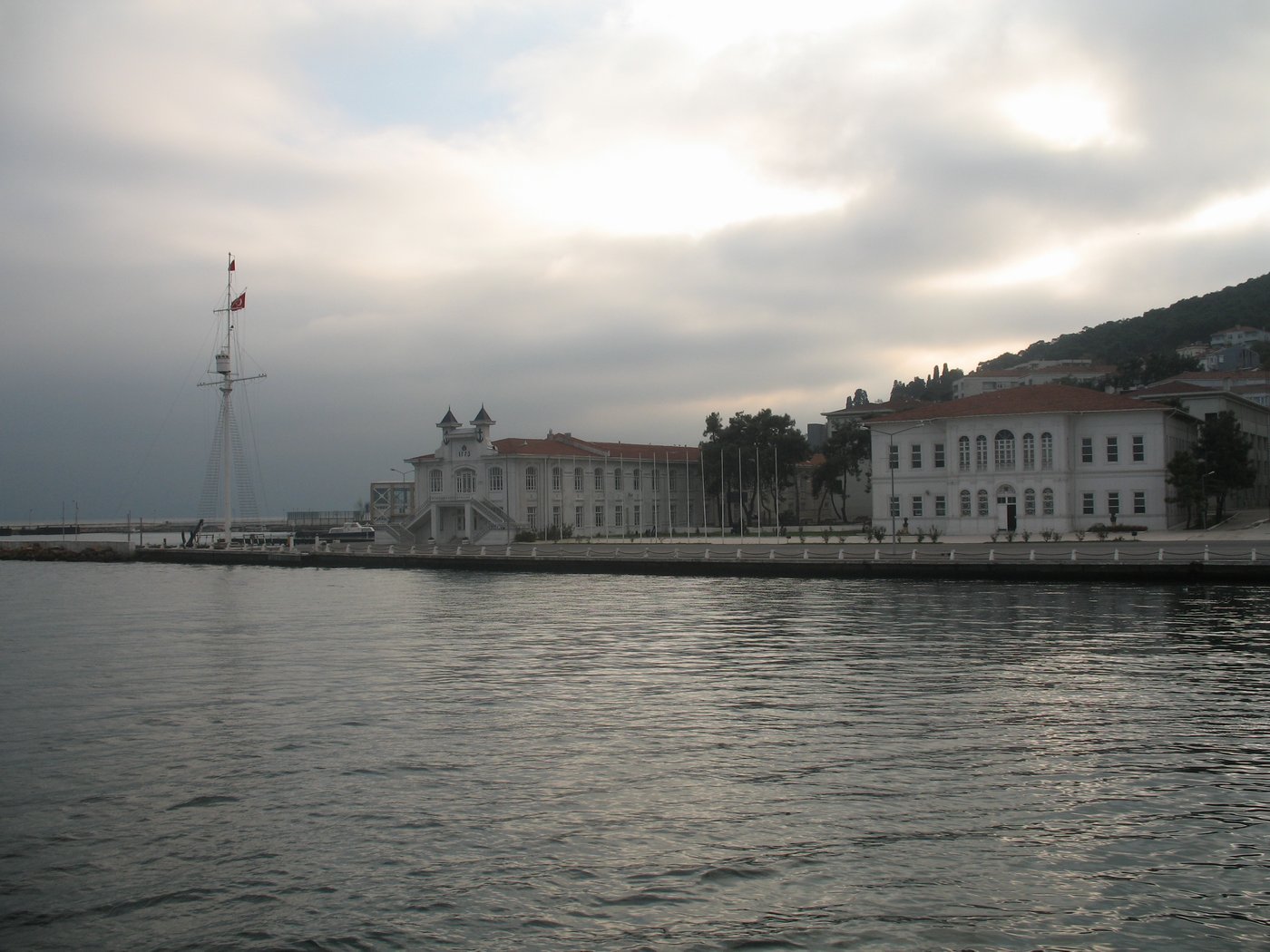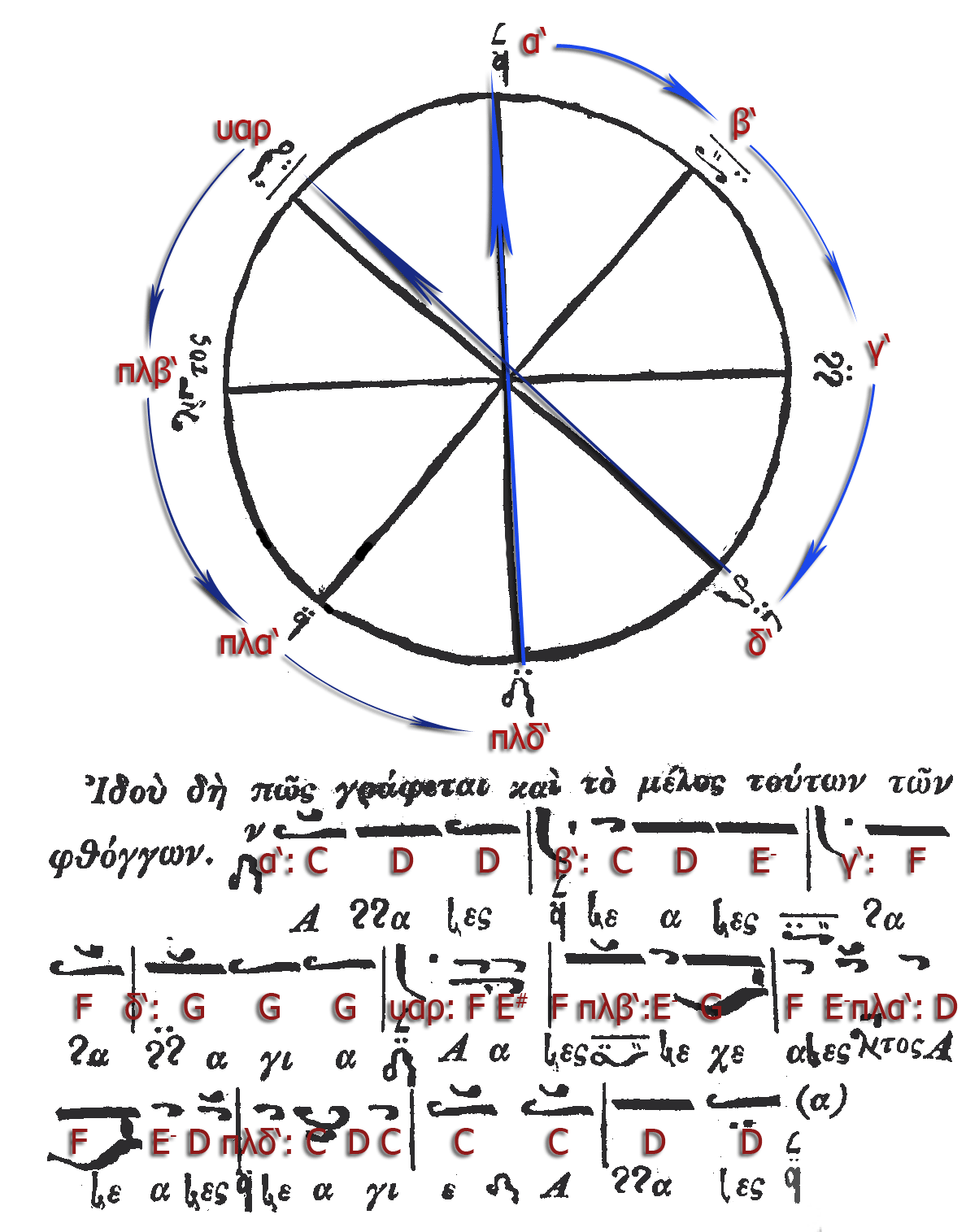|
Chourmouzios The Archivist
Chourmouzios the Archivist or Chourmouzios Chartophylax ( gr, Χουρμούζιος ὁ Χαρτοφύλαξ, "Chourmoúzios the Chartophýlax"), also known with the nickname "the Chalkenteros" (, "he with a copper intestine"), born Chourmouzios Georgiou (; Heybeliada, Halki, c. 1770 – Halki, 1840) was an Ottoman Greeks, Ottoman Greek composer, musician, music teacher and secretary of the Ottoman Empire.#EcPatr1982, Ecclesiastical Patriarchy Early life Chourmouzios was the son of Georgios and was born in Heybeliada, Halki, an island in Propontis, and due to a meaty protuberance on the head, they called him "Yamalis" (Turkish language, Turkish: ''yamali'', "patched"). He was a student of the Byzantine music famous cantors and music teachers Iakovos Protopsaltes and Georgios of Crete. Career Chourmouzios served for 40 years as a lead Cantor (Christianity), cantor in Saint Demetrius of Kurtuluş, Tatavla, in Saint John of Galata, in the Sinaitic Metochion of Balat, Fatih, Vala ... [...More Info...] [...Related Items...] OR: [Wikipedia] [Google] [Baidu] |
Heybeliada
Heybeliada, or Heybeli Ada, is the second largest of the Prince' Islands in the Sea of Marmara, near Istanbull, Turkey. It is officially a neighbourhood of the Adalar district of Istanbul. Its name, meaning 'with a saddlebag' in Turkish, in supposed reference to the valley between two hills. The island was known as ''Halki'', ''Halkitis'' ( el, Χαλκίτις) and ''Demonesos'' ( Greek: Δημόνησος) in antiquity, the first two toponyms deriving from the Greek word ''halkos'' ( el, χαλκός), meaning copper. The island was famous for its copper and copper ores in antiquity. In winter the island's population is only about 5,500, but in summer, the owners of summer houses return and the population swells to approximately 30,000. Launched in 2008, TCG ''Heybeliada'', used by the Turkish Navy is named after the island. Until 2020, the only vehicles permitted on the island were ambulances, fire tenders, police cars etc; the only official form of transport was by ... [...More Info...] [...Related Items...] OR: [Wikipedia] [Google] [Baidu] |
Cantor (Christianity)
In Christianity, the cantor, sometimes called the precentor or the protopsaltes (; from ), is the chief singer, and usually instructor, employed at a church, with responsibilities for the choir and the preparation of the Mass or worship service. Generally, a cantor must be competent to choose and conduct the vocals for the choir, to start any chant on demand, and to be able to identify and correct the missteps of singers placed under them. A cantor may be held accountable for the immediate rendering of the music, showing the course of the melody by movements of the hand(s) (''cheironomia''), similar to a conductor. Western Christianity Roman Catholicism Before and after the Second Vatican Council, a ''cantor'' in the Roman Catholic Church was the leading singer of the choir, a ''bona fide'' clerical role. The medieval cantor of the papal Schola Cantorum was called ''Prior scholae'' or ''Primicerius''. In medieval cathedrals, the cantor or precentor directed the music and ... [...More Info...] [...Related Items...] OR: [Wikipedia] [Google] [Baidu] |
Patriarch Cyril II Of Jerusalem
Cyril II of Jerusalem (original name Konstantinos Kritikos, 1792 – August 18, 1877) was a 19th-century patriarch of Jerusalem. Cyril was born in 1792 in the island of Samos. In 1816 he was ordained a deacon, then a presbyter, was abbot of the monastery. In 1835 he became Archbishop of Sebasteia and in 1838 of Lydia. In 1845 he was elected as the Greek Orthodox Patriarch of Jerusalem under the name Cyril II (1846–1872) by the ''Hagiotaphites'' ( Confraternity of the Holy Sepulchre) and remains to 1872. On February 28, 1870, Sultan Abdulaziz signed a '' firman'' which created the Bulgarian Exarchate subjectеd to the Ecumenical Patriarchate but yet as a representative of the Bulgarian '' millet'' in the Ottoman Empire. Cyril II participated in the Council in Constantinople, chaired by Ecumenical Patriarch Anthimus VI, in September 1872, wherein the Patriarchs of Alexandria and Antioch also participated and which on 18/30 September declared the Bulgarian Exarchate as ... [...More Info...] [...Related Items...] OR: [Wikipedia] [Google] [Baidu] |
Patriarch Athanasius V Of Jerusalem
Athanasius V (died 1844) was Greek Orthodox Patriarch of Jerusalem (1827 – December 28, 1844). He was born in Edirne Edirne (, ), formerly known as Adrianople or Hadrianopolis (Greek: Άδριανούπολις), is a city in Turkey, in the northwestern part of the province of Edirne in Eastern Thrace. Situated from the Greek and from the Bulgarian borders, .... 1844 deaths People from Edirne 19th-century Greek Orthodox Patriarchs of Jerusalem 1827 births {{EasternOrthodoxy-bishop-stub ... [...More Info...] [...Related Items...] OR: [Wikipedia] [Google] [Baidu] |
Manuel Protopsaltes , a common nickname for those named Manuel
{{disambiguation ...
Manuel may refer to: People * Manuel (name) * Manuel (Fawlty Towers), a fictional character from the sitcom ''Fawlty Towers'' * Charlie Manuel, manager of the Philadelphia Phillies * Manuel I Komnenos, emperor of the Byzantine Empire * Manuel I of Portugal, king of Portugal Places *Manuel, Valencia, a municipality in the province of Valencia, Spain *Manuel Junction, railway station near Falkirk, Scotland Other * Manuel (American horse), a thoroughbred racehorse * Manuel (Australian horse), a thoroughbred racehorse *Manuel and The Music of The Mountains, a musical ensemble * ''Manuel'' (album), music album by Dalida, 1974 See also *Manny Manny is a common nickname for people with the given name Manuel, Emanuele, Immanuel, Emmanuel, Herman, or Manfred. People * Manny Acosta (born 1981), Panamanian pitcher in the Mexican Baseball League * Manny Acta (born 1969), Dominican Major ... [...More Info...] [...Related Items...] OR: [Wikipedia] [Google] [Baidu] |
Saint John Of Damascus
John of Damascus ( ar, يوحنا الدمشقي, Yūḥanna ad-Dimashqī; gr, Ἰωάννης ὁ Δαμασκηνός, Ioánnēs ho Damaskēnós, ; la, Ioannes Damascenus) or John Damascene was a Christian monk, priest, hymnographer, and apologist. Born and raised in Damascus c. 675 or 676; the precise date and place of his death is not known, though tradition places it at his monastery, Mar Saba, near Jerusalem on 4 December 749. A polymath whose fields of interest and contribution included law, theology, philosophy, and music, he was given the by-name of Chrysorroas (Χρυσορρόας, literally "streaming with gold", i.e. "the golden speaker"). He wrote works expounding the Christian faith, and composed hymns which are still used both liturgically in Eastern Christian practice throughout the world as well as in western Lutheranism at Easter. He is one of the Fathers of the Eastern Orthodox Church and is best known for his strong defence of icons. The Catholic Church ... [...More Info...] [...Related Items...] OR: [Wikipedia] [Google] [Baidu] |
Great Church Of Constantinople
The Ecumenical Patriarchate of Constantinople ( el, Οἰκουμενικὸν Πατριαρχεῖον Κωνσταντινουπόλεως, translit=Oikoumenikón Patriarkhíon Konstantinoupóleos, ; la, Patriarchatus Oecumenicus Constantinopolitanus; tr, Rum Ortodoks Patrikhanesi, İstanbul Ekümenik Patrikhanesi, "Roman Orthodox Patriarchate, Ecumenical Patriarchate") is one of the fifteen to seventeen autocephalous churches (or "jurisdictions") that together compose the Eastern Orthodox Church. It is headed by the Ecumenical Patriarch of Constantinople, currently Bartholomew, Archbishop of Constantinople. Because of its historical location as the capital of the former Eastern Roman (Byzantine) Empire and its role as the mother church of most modern Orthodox churches, Constantinople holds a special place of honor within Orthodoxy and serves as the seat for the Ecumenical Patriarch, who enjoys the status of ''primus inter pares'' (first among equals) among the world's Eas ... [...More Info...] [...Related Items...] OR: [Wikipedia] [Google] [Baidu] |
Ecclesiastical Music
Christian music is music that has been written to express either personal or a communal belief regarding Christian life and faith. Common themes of Christian music include praise, worship, penitence, and lament, and its forms vary widely around the world. Church music, hymnals, gospel and worship music are a part of Christian media, and also include contemporary Christian music which itself supports numerous Christian styles of music, including hip hop, rock, contemporary worship, and urban contemporary gospel. Like other forms of music the creation, performance, significance, and even the definition of Christian music varies according to culture and social context. Christian music is composed and performed for many purposes, ranging from aesthetic pleasure, religious or ceremonial purposes, or with a positive message as an entertainment product for the marketplace. Worship services Among the most prevalent uses of Christian music are in church worship or other gat ... [...More Info...] [...Related Items...] OR: [Wikipedia] [Google] [Baidu] |
Chrysanthos Of Madytos
Chrysanthos of Madytos ( el, Χρύσανθος ὁ ἐκ Μαδύτων; c. 1770 – 1846) was a Greek poet, chanter, Archimandrite, and Archbishop, born in Madytos. In preparation of the first printed books of Orthodox chant, he was responsible for a reform of the Byzantine notation within the New Music School of the Patriarchate, along with Gregorios the Protopsaltes and Chourmouzios the Archivist who transcribed the traditional repertory into the Chrysanthine notation. Life Chrysanthos and the reform of Orthodox chant Works * * *. Publications made in his name * * Translations * * See also *Neobyzantine Octoechos—Byzantine music *Ottoman classical music Notes and references Sources * * * External links *Chrysanthos of Madytos Chrysanthos of Madytos ( el, Χρύσανθος ὁ ἐκ Μαδύτων; c. 1770 – 1846) was a Greek poet, chanter, Archimandrite, and Archbishop, born in Madytos. In preparation of the first printed books of Orthodox chant, ... [...More Info...] [...Related Items...] OR: [Wikipedia] [Google] [Baidu] |
Gregorios Protopsaltes
Gregorios or Gregorius may refer to: People * Gregorios Abdal Jaleel (died 1681), bishop and saint of the Syriac Orthodox Church * Gregorios Bernardakis (1848–1925), Greek philologist, palaeographer and professor * Gregorios Yohanna Ibrahim (born 1948), Syriac Orthodox archbishop of Aleppo and kidnap victim * Gregorios Joseph (born 1960), Syriac Orthodox bishop * Gregorios Kuriakose (born 1954), Syriac Orthodox bishop * Gregorius Nekschot, pseudonym of an anonymous and prosecuted Dutch cartoonist * Gregorios Papamichael (1875–1956), theologian of the Orthodox Church of Greece * Benedict Gregorios (1916–1994), second Metropolitan Archbishop of the Syro-Malankara Catholic Church * Gabriel Mar Gregorios (born 1949), Metropolitan of the Diocese of Thiruvananthapuram of the Indian (Malankara) Orthodox Church * Geevarghese Gregorios of Parumala (1848–1902), bishop and saint of the Malankara Syrian Church and saint of the Syriac Orthodox Church * Paulos Gregorios (1922–1996), ... [...More Info...] [...Related Items...] OR: [Wikipedia] [Google] [Baidu] |
Neobyzantine Octoechos
Oktōēchos (here transcribed "Octoechos"; Greek: ; from ὀκτώ "eight" and ἦχος "sound, mode" called echos; Slavonic: Осмогласие, ''Osmoglasie'' from о́смь "eight" and гласъ "voice, sound") is the name of the eight mode system used for the composition of religious chant in Byzantine, Syriac, Armenian, Georgian, Latin and Slavic churches since the Middle Ages. In a modified form the octoechos is still regarded as the foundation of the tradition of monodic Orthodox chant today. From a Phanariot point of view, the re-formulation of the Octoechos and its melodic models according to the New Method was neither a simplification of the Byzantine tradition nor an adaption to Western tonality and its method of an heptaphonic solfeggio, just based on one tone system (σύστημα κατὰ ἑπταφωνίαν). Quite the opposite, as a universal approach to music traditions of the Mediterranean it was rather based on the integrative power of the psalti ... [...More Info...] [...Related Items...] OR: [Wikipedia] [Google] [Baidu] |





